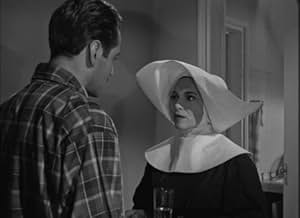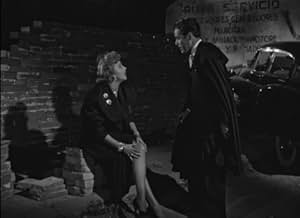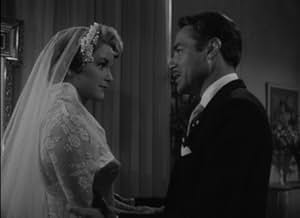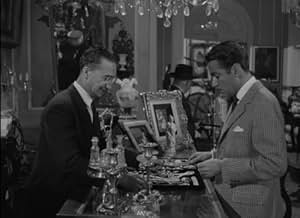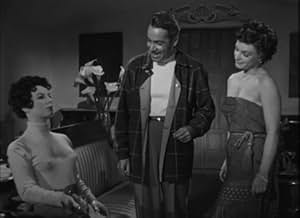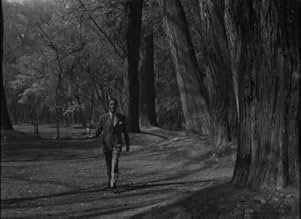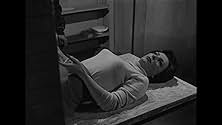IMDb रेटिंग
7.6/10
6.2 हज़ार
आपकी रेटिंग
अपनी भाषा में प्लॉट जोड़ेंThe delirious journey of a mentally-disordered man who is obsessed with committing the perfect crime.The delirious journey of a mentally-disordered man who is obsessed with committing the perfect crime.The delirious journey of a mentally-disordered man who is obsessed with committing the perfect crime.
- निर्देशक
- लेखक
- स्टार
- पुरस्कार
- 1 जीत और कुल 8 नामांकन
Ariadne Welter
- Carlota Cervantes
- (as Ariadna Welter)
José María Linares-Rivas
- Willy Corduran
- (as J.M. Linares Rivas)
Enrique Díaz Indiano
- Señor de la Cruz
- (as Enrique Indiano)
Carlos Martínez Baena
- Padre Alonso
- (as Carlos M. Baena)
Armando Acosta
- Hombre casa juegos
- (बिना क्रेडिट के)
Eduardo Alcaraz
- Gordo Azuara
- (बिना क्रेडिट के)
Janet Alcoriza
- Turista de Oklahoma
- (बिना क्रेडिट के)
फ़ीचर्ड समीक्षाएं
Again, Bunuel explores the disturbing mentality of a member of the privileged class. The premise is very amusing: a would-be serial killer whose attempts are constantly thwarted by circumstance. The film has some wonderful touches like the demented music box theme, the fantasies when Archie gets in one of his murderous moods, and again a focus on the lower half of the female form. Ernesto Alonso and the entire cast are terrific. However, the film does have a certain sluggishness to it, and the first two acts in particular seem to contain a lot of superfluous material that doesn't add much to the whole. I also feel the ending could use more of a cynical bite to it. Still, it's better than a lot of his 50's work, if not quite as remarkable as EL or LOS OLVIDADOS.
I don't understand why some reviewers call "Criminal Life of Archibaldo De La Cruz" (1955) - "minor" Bunuel. The only "minor" about this (and many his films) is its running time, only 89 minutes but all his films are enigmatic, odd, charming, and always brilliant. I consider Bunuel one of the best and original filmmakers ever and nothing he had done is minor for me.
"Criminal Life of Archibaldo De La Cruz is B/W comedy of Don Luis' Mexican period which is surreal, disturbing, erotic and funny satire about a perverted young wealthy man, an amateur sculptor. Since he was a boy, and one evening witnessed the sudden death of his young attractive governess and became sexually exited by it, Archibaldo De La Cruz dreams of committing a perfect crime of an attractive woman to recreate the feeling but something always prevents him from fulfilling his dreams. It does not mean that the deaths would not occur -it is just that Archibaldo can't take a credit for them. As he often did with his even unlikable and perverse characters, Bunuel gives some of his own sexual fantasies, fetishes, and dreams that he freely admits to Archibaldo thus making him more human and sympathetic.
"Criminal Life of Archibaldo De La Cruz is B/W comedy of Don Luis' Mexican period which is surreal, disturbing, erotic and funny satire about a perverted young wealthy man, an amateur sculptor. Since he was a boy, and one evening witnessed the sudden death of his young attractive governess and became sexually exited by it, Archibaldo De La Cruz dreams of committing a perfect crime of an attractive woman to recreate the feeling but something always prevents him from fulfilling his dreams. It does not mean that the deaths would not occur -it is just that Archibaldo can't take a credit for them. As he often did with his even unlikable and perverse characters, Bunuel gives some of his own sexual fantasies, fetishes, and dreams that he freely admits to Archibaldo thus making him more human and sympathetic.
Following your advice, I recently `relented' to buying from Alapage the two Luis Bunuel Double-Feature discs released in France by Film Sans Frontieres. After watching them in their entirety, I cannot believe that I, who consider Bunuel my all-time favorite director and one of the true masters of the medium, have waited this long to acquire these DVDs. Actually while Alapage listed these DVDs at EUR25.73 on their site, they only cost me EUR21.51 each (excluding EUR12 shipping charges). So, if there is still anybody who has not purchased them yet, now may be the time to do so!
Since I had never watched EL (1952) before, it was the first one to go through my DVD player. It was a chilling parable of an insanely jealous middle-aged man played with acute intensity by Arturo De Cordova. It afforded Bunuel ample opportunity to make practical use of overt Freudian symbolism without lending the film a heavy-handed air of pretentiousness. While there are some critics who consider it as merely `an engaging, minor work', I regard it as being among Bunuel's finest; arguably, with this film, Bunuel reached the culmination of his work in Mexico, but it also looks forward to similar sequences and themes he would tackle later on in his career, especially TRISTANA (1970) and, his last film, THAT OBSCURE OBJECT OF DESIRE (1977).
EL was beautifully abetted by another of his low-budget Mexican films, the great black comedy THE CRIMINAL LIFE OF ARCHIBALDO DE LA CRUZ (1955). Again, critical reception was a bit muted in some circles, dismissing it as `just a throwaway oddity' typical of Bunuel's films of the period. However, it is much more than that: it is certainly very funny if you can accept its macabre sense of humor. It allowed Bunuel to create some of the most memorable images in all of his films, especially the celebrated dummy incineration scene, which could have been "inspired" by a similar scene in Michael Curtiz's marvelous MYSTERY OF THE WAX MUSEUM (1933) which Bunuel must have seen while working at Warner Bros. in the Thirties. A similar instance of this eclectic approach on Bunuel's part can be found in the "walking hand" sequence in his THE EXTERMINATING ANGEL (1962) - one of my favorite Bunuels - which harks back to an identical premise in Robert Florey's THE BEAST WITH FIVE FINGERS (1946), another Warner Bros. horror melodrama. For me, one of the enduring assets of THE CRIMINAL LIFE OF ARCHIBALDO DE LA CRUZ is the charm and great beauty that was Miroslava Stern (who played the part of Lavinia and was the model for the ill-fated dummy). Tragically, she would take her own life a mere two weeks after the film's release with her body, ironically enough, ending up cremated!
Both the print utilized and the transfer for both films were adequate enough, and perfectly acceptable under the circumstances. However, EL's overall visual and aural qualities where distinctly superior to those of ARCHIBALDO which suffered from excessive specks and slight audio dropouts at times, but were never so alarming as to dispel from one's viewing pleasure of the film.
Since I had never watched EL (1952) before, it was the first one to go through my DVD player. It was a chilling parable of an insanely jealous middle-aged man played with acute intensity by Arturo De Cordova. It afforded Bunuel ample opportunity to make practical use of overt Freudian symbolism without lending the film a heavy-handed air of pretentiousness. While there are some critics who consider it as merely `an engaging, minor work', I regard it as being among Bunuel's finest; arguably, with this film, Bunuel reached the culmination of his work in Mexico, but it also looks forward to similar sequences and themes he would tackle later on in his career, especially TRISTANA (1970) and, his last film, THAT OBSCURE OBJECT OF DESIRE (1977).
EL was beautifully abetted by another of his low-budget Mexican films, the great black comedy THE CRIMINAL LIFE OF ARCHIBALDO DE LA CRUZ (1955). Again, critical reception was a bit muted in some circles, dismissing it as `just a throwaway oddity' typical of Bunuel's films of the period. However, it is much more than that: it is certainly very funny if you can accept its macabre sense of humor. It allowed Bunuel to create some of the most memorable images in all of his films, especially the celebrated dummy incineration scene, which could have been "inspired" by a similar scene in Michael Curtiz's marvelous MYSTERY OF THE WAX MUSEUM (1933) which Bunuel must have seen while working at Warner Bros. in the Thirties. A similar instance of this eclectic approach on Bunuel's part can be found in the "walking hand" sequence in his THE EXTERMINATING ANGEL (1962) - one of my favorite Bunuels - which harks back to an identical premise in Robert Florey's THE BEAST WITH FIVE FINGERS (1946), another Warner Bros. horror melodrama. For me, one of the enduring assets of THE CRIMINAL LIFE OF ARCHIBALDO DE LA CRUZ is the charm and great beauty that was Miroslava Stern (who played the part of Lavinia and was the model for the ill-fated dummy). Tragically, she would take her own life a mere two weeks after the film's release with her body, ironically enough, ending up cremated!
Both the print utilized and the transfer for both films were adequate enough, and perfectly acceptable under the circumstances. However, EL's overall visual and aural qualities where distinctly superior to those of ARCHIBALDO which suffered from excessive specks and slight audio dropouts at times, but were never so alarming as to dispel from one's viewing pleasure of the film.
Yet another perfectly constructed story by Buñuel, but this time the pace of the film just doesn't feel right. As a viewer i usually have found myself trapped between the unceasing spanish dialogues. The portray of a mentally ill killer should've been more distant from the common reality, if not within the dialogues, then through the usage of scenery and theatrical production, which in this case was monotone and non-corresponding to a thrilling-tempting view
10zetes
Perhaps my favorite of Buñuel's Mexican years. As a child, Archibaldo de la Cruz willed the death of his young, sexy nanny through the device of a magical music box. As an adult, he finds this box at a pawn shop, and it awakens the exciting feelings he had as he stood over the corpse of his nanny checking out her exposed thigh. He decides to become a serial killer, but it never quite works out that way. Every person he sets out to kill ends up being murdered by another's hand. Actually, I shouldn't say "person," as Archibaldo's violent emotions only arise towards women. There is some heavy Catholic symbology to the picture, and the violence towards women obviously arises from the twisted mores of Catholicism. His first intended victim as an adult, for example, is a brazen tramp who openly expresses her wish to seduce him to get back at her husband. Buñuel had perhaps the most impeccable sense for creating finales, and the one here is as odd and remarkable as any other. Watch the two actions Archibaldo performs with his cane. I'm not 100% sure what they signify, but I know that must be of the utmost importance. Ensayo de un crimen should be watched back to back with Buñuel's 1953 film, Él, also about a man being driven insane over his wife because of his strict religious beliefs. 10/10.
क्या आपको पता है
- ट्रिवियाThe movie was shot in the middle of a big economic crisis for the Mexican cinema. Production was about to be shut down a few times and the famous scene with the mannequin being cremated was filmed only once because they couldn't afford another mannequin.
- गूफ़When the nun falls down the empty elevator shaft she screams loudly but the sound is obviously that of a man; in fact, it sounds like a Wilhelm Scream.
टॉप पसंद
रेटिंग देने के लिए साइन-इन करें और वैयक्तिकृत सुझावों के लिए वॉचलिस्ट करें
- How long is The Criminal Life of Archibaldo de la Cruz?Alexa द्वारा संचालित
विवरण
- रिलीज़ की तारीख़
- कंट्री ऑफ़ ओरिजिन
- भाषाएं
- इस रूप में भी जाना जाता है
- The Criminal Life of Archibaldo De La Cruz
- फ़िल्माने की जगहें
- उत्पादन कंपनी
- IMDbPro पर और कंपनी क्रेडिट देखें
- चलने की अवधि1 घंटा 29 मिनट
- रंग
- ध्वनि मिश्रण
- पक्ष अनुपात
- 1.37 : 1
इस पेज में योगदान दें
किसी बदलाव का सुझाव दें या अनुपलब्ध कॉन्टेंट जोड़ें



